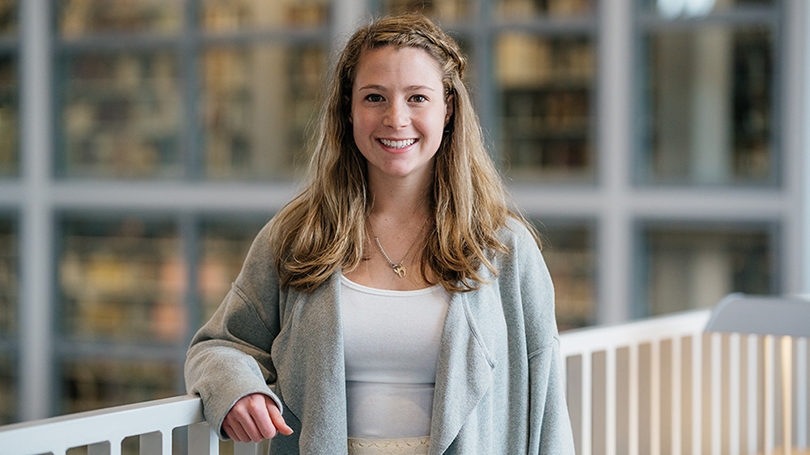Allison Gelman ’18, a double major in history and economics from Clarendon Hills, Ill., has been named a James C. Gaither Junior Fellow at the Carnegie Endowment for International Peace.
The Carnegie Endowment is a global network of policy research centers in Russia, China, Europe, the Middle East, India, and the United States whose mission, according to its website, is “to advance peace through analysis and development of fresh policy ideas and direct engagement and collaboration with decision-makers in government, business, and civil society.”
As a Gaither Junior Fellow, Gelman will be one of 13 recent graduates—selected from a pool of nominees from several hundred participating colleges and universities—conducting policy-research experience with Carnegie’s senior scholars in Washington, D.C. Gelman will be working on issues related to geoeconomics and strategy.
“One of the best things about this fellowship is that I’ll be learning from people who’ve worked in the private sector, in government, people who’ve come from a lot of different policy areas,” Gelman says. “I’m hoping I’ll come out of this year with new skills and a new understanding of what opportunities look like in the policy world.”
Gelman’s love of research began early in her career at Dartmouth. As a first-year student, she worked on Assistant Professor of Art History Nicola Camerlenghi’s Mapping Rome project. Then she worked with Associate Professor of History Richard Kremer to uncover the history of two 19th-century telescopes in the Shattuck Observatory.
“One of the transit telescopes was used to help set the clock at Dartmouth Hall—that was really fun to find out,” Gelman says. “It’s fun to dive in and to be able to say this is the significance of an artifact and to share that knowledge. I loved taking facts that people didn’t know and piecing them together into story. Professor Kremer is an incredible professor—he let me loose in Rauner to find what interested me.”
Through that project, Gelman discovered an affinity for Dartmouth Library’s Rauner Special Collections Library. This term she’s working there as a student assistant, helping to prepare materials for classes and researching special projects about Dartmouth’s history.
For her culminating project in economics, she explored the impact of education levels on migration in Malawi. “It was a really cool project, and there’s no way I could have done it without the help of my professor,” she says. “When I say professors turn me loose to do independent research, they’re always there supporting me, holding office hours, and helping push me through the challenges.”
She is currently a research assistant for Eric Edmonds, a professor of economics, researching programs that help the ultra-poor and their effects on children.
“Allison is hardworking and really stands out for her intellectual curiosity,” says Edmonds. “I first encountered her in ‘Economics 24,’ a course that helps students understand and appreciate the ingenuity in the lives of the global poor, and she actively engaged with course material outside of the classroom. This led her to pursue and win a Human Development Fellowship at the Dickey Center to build her GIS and statistical programming skills and has been able to contribute to projects related to promoting entrepreneurship in the Philippines, understanding the transmission of gender norms in India, and causes of human bondage in Nepal.”
Gelman has served as a trip leader for Dartmouth Outing Club First-Year Trips, participated in a history department foreign study program in London, and spent an off-term as a summer equity associate at Putnam Investments and another as a consulting intern at Altman Vilandrie & Co.
Of her academic experience at Dartmouth, she says, “I’ve loved how I’ve gotten to think differently. One of my favorite classes was ‘Computer Science 1.’ That had me thinking about finding paths to solutions through programming. I took a geography class on global health, and then you’re thinking a totally different way. And I just took ‘Classics 1,’ which was very anthropological, and my first government class last term. They were phenomenal.”
This broad exposure to the liberal arts has made her more intellectually agile, she says. “I think methodically—I’m very data-driven—but at the same time, I can think qualitatively and from different perspectives. I got that by mixing a variety of classes, especially through my economics and history majors.”
Another big part of her Dartmouth experience, she says, was giving tours to prospective students, which she did up until this year. “Giving tours helped me continue to love Dartmouth, because every time you give the tour you think back about all the cool things opportunities and experiences I had here,” she says.
Of receiving the Gaither Fellowship, Gelman says, “I could have never have done this without the support of my family. My parents and siblings have been incredibly supportive.”
Students interested in learning about the Gaither Junior Fellowships and other fellowship opportunities should visit Dartmouth’s Office of Fellowship Advising.
Hannah Silverstein can be reached at hannah.silverstein@dartmouth.edu.
